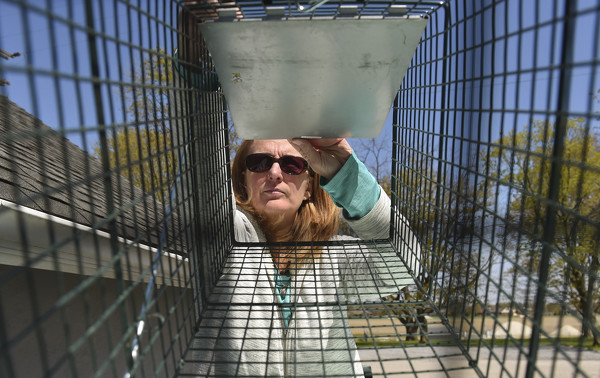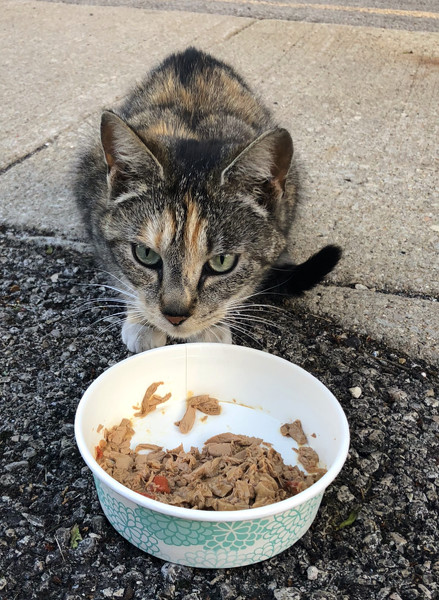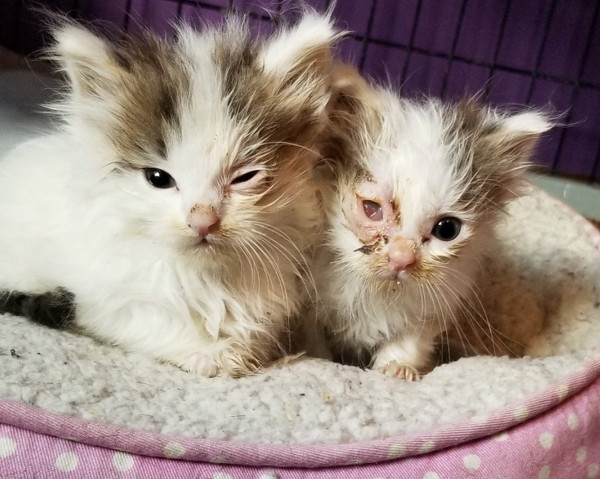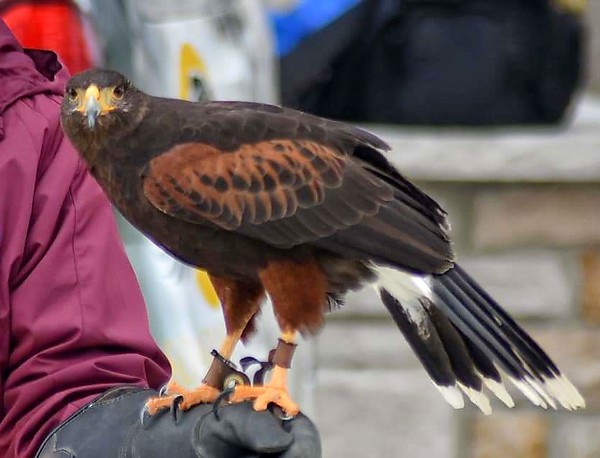Monday, April 26th, 2021
Like Herding Cats
Volunteers address feral feline problem
By William Kincaid

Photo by Dan Melograna/The Daily Standard
Sara Kriegel of Celina Cares: A Community Cat Page sets a trap outside the boiler room of the Mercer County Home Friday afternoon.
CELINA - Local volunteers are looking to make a dent in feral/stray cat overpopulation, a situation that poses health risks to felines and a burden to caretakers.
Celina residents Sara Kriegel and Jackie Crouch in late 2019 launched Celina Cares: A Community Cat Page Facebook group. Since then, they have amassed more than 1,500 members and gained nonprofit limited liability company status.
"We started it because Celina - or Mercer County, for that matter - does not have a humane society," Kriegel said. "They do not have anything that services cats or provides a low cost spay and neuter service."
Excess stray/feral cats levels leads to disease and parasites that can spread to humans, among a host of other issues, Kriegel said.
"It's just not a healthy situation for the cats, because the cats then start to inbreed and then the cats aren't healthy, the humans that take care of them are not healthy," she explained.
To illustrate just how out of control the predicament can become, Kriegel noted that over the course of 8 years, a single unfixed cat couple can set into motion a reproduction cycle resulting in 2 million cats.
In Mercer County, stray/feral cats congregate in areas where they can find shelter and a steady source of food, sometimes supplied by caring humans. Examples include local mobile home courts, the Mercer County Fairgrounds and certain residences, such as the Mercer County Home located east of Celina.
"People think there isn't a feral or stray cat problem but when you start getting to places like this (county home), you'll see that there really is. We've taken 33 (cats) out of here in just a week," Kriegel said. "We just wanted a way to be able to help and provide a low cost spay and neuter service."
The volunteers target what they call colony feeders - people who provide food and water for stray and feral cats. They collect the cats, mostly by trapping, and facilitate spay-and-neutering, vaccination shots and worm and flea treatments.
"Everybody in our group is strictly volunteers. Nobody's paid anything," Kriegel said. "We have colony feeders that will take care of the cats that we fix. They may have already been feeding a few cats at their house and we will help them get them fixed and then we provide food, if we get the donations of food."
Those services are provided at a cost of $29 per cat through an arrangement with Humane Ohio in Toledo. Each cat also is marked by having a quarter-inch of its left ear removed.
"That helps us identify a cat that's already been fixed," she said. "We trap in the same location, we get a cat, we see the ear tip, we know they've been fixed. We can let them go."
From March to November, a box truck is dispatched monthly to Kriegel's residence. It transports 34 cats to Toledo and back. Kriegel said up to 20 spots are reserved for stray and feral cats. The remaining slots are for pets.
Cats are then returned to the places from where they were taken.
"They need to be released where they were trapped or they will not know where food is. That's why it's important that we have colony caretakers," she said. "For example, we have people that have already been feeding 10 cats at their house. Well, if these 10 cats aren't fixed, you're soon going to have a real problem."
Some people balk at the $29 price tag for cat services, but it will pay off down the road, Kriegel said, noting it's a very affordable cost that the group can help with if necessary.
"When you get the cats fixed, then control that population and it doesn't become (overwhelming)," she pointed out. "People say, 'Well, I can't afford to get them fixed,' and I say, 'Well, can you afford to feed 30 cats two years from now?' Because that's what happens."
Volunteers, in return, with public donations, supply kitten and adult cat food, formula, litter and other provisions to colony feeders.
"We try to adopt out as many of the cats and kittens that we can. We try to focus on the kittens because all of our volunteers that do the fostering, they all have pets of their own, and it's really hard to bring another cat into your home," she said. "Last year, we adopted out 95 kittens and 17 adult cats."
The group is always looking for more volunteers, including colony feeders and adoption parents, and monetary donations. For instance, volunteers in just a few days had already incurred more than $1,000 in costs to remove and care for the cats at the county home.
The group can best be contacted on its Facebook page, which contains a PayPal link.

Submitted Photo
A feral cat pauses between bites.

Submitted Photo
A pair of feral cats are on the mend.


